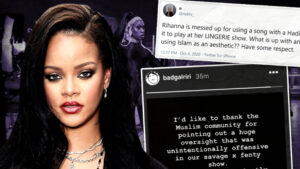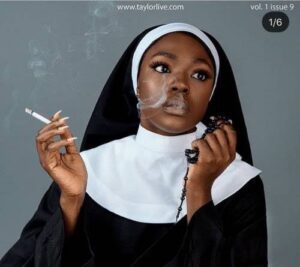A former entertainment writer with one of Nigeria’s leading softsell journals, Mr. Rasheed Abubakar has called on Nigerian entertainers, especially the music stars to thread the path of global top singer, Rihanna, in respecting people’s religious rights.
While reacting to the news of Rihanna’s apology to the Muslim community after being lashed on social media for playing a Hadith during her fashion show, Mr. Abubakar said the faith of others should not be trampled on, all in the name of entertainment.
The ‘Good Girl Gone Bad’ singer during her fashion show played the saying of the Prophet Muhammad in a sexualized context and has since apologised, noting it was ‘completely irresponsible’ following reactions from Muslims on social media.

The Nigerian journalist said though Rihanna is one of the most controversial singers in the world, tendering an apology to the Muslim community for the offensive show is commendable.
He urged Nigerian celebrities to take a cue from her action.
According to him, “Rihanna isn’t a saint considering her many controversies but issuing an apology to the Muslims is a great deal. We live in a world where people, both celebrities and non-celebrities alike find it difficult to say ‘I’m sorry’. We are in the world where people insult the Prophets of God and ridicule religious beliefs and identities of others under the disguise of entertainment and freedom.
“She could have hidden under freedom but buried her pride and tendered an unreserved apology to the Muslims after the fall-out from the controversial Savage X Fenty Fashion Show where she used the song titled Doom by artist Coucou Chloe, which includes a Muslim text known as a Hadith,” he noted.

Mr. Abubakar, who is the publisher of Muslim News, Nigeria’s most authoritative Islamic newspaper, said Islamic symbols have on several occasions been ridiculed in Nigeria with perpetrators justifying their actions.
“There are cases of insult to religion, intentionally or unintentionally among Nigerian entertainers but it is rare to see them apologising for offending the religious sensibilities of their fans, many of whom are also Muslims. Often times, they hide under freedom of speech to defend their shenanigans. They would never admit their mistakes, not to talk of apologising.”
Abubakar cited the case of Falz the Bahd Guy, who in June 2018, insulted the Hijab, the Muslims religious attire, in his trending video, ‘This is Nigeria’, a cover of Childish Gambino’s ‘This Is America’.
“When Falz featured women in Hijab as choreographers doing the ‘shaku-shaku’ dance moves which had been linked with a drug-related song in ‘This is Nigeria’, many Muslims expressed their disappointment, thereby requesting his apology and that the video be withdrawn. However, the singer didn’t do any. Instead, he hid under freedom.

“This is what we see in Nigeria. Rihanna didn’t only apologise, the artist, Coucou Chloe, whose song she played also apologised and promised to withdraw the portion of the Hadith from the song. That is how it should be,” he said.
Mr. Abubakar also stated that Christianity symbols have also been subjected to ridicule in the Nigerian entertainment industry, citing the scandalous pictures of former Big Brother Africa (BBA) housemate, Beverly Osu, who was captured smoking in a seductive nun attire with a rosary in hand, as appeared online on September 10, 2018.
“Between then and now, there have been many cases of insult to religion in the entertainment circle and all efforts for the regulator to tame it have been abortive. Sometimes in November 2019, Nollywood actor, Etinosa Idemudia used the Bible as ashtray while smoking and also vowed to use the Qur’an. After a month of criticism online, she later apologised, saying she wasn’t in her right senses.”

While calling on the authorities to protect the religious symbols of both religions from ridicule, the author of “Islam and the media series 1 to 4” urged all Muslims to be coordinated in reacting to violations against their religious rights and freedom within the legal provision and avoid being extreme or taking the law into their hands without being negligent.
He said, “Let me also say this to our dear Muslim brothers and sisters especially in Nigeria, some of them would have said Rihanna should have been left alone, just like some of them said during the Falz saga. They would have even said such reaction would make the offensive show or songs/videos popular.
“If we fail to speak out, the troublemakers might do worse in the future. We need to speak against Islamophobia on social media all together with one voice. At the same time, it must be peacefully coordinated. It shouldn’t be left to an individual to defend the rights of millions of Muslims. The social media protest against Rihanna was indeed a success.”



